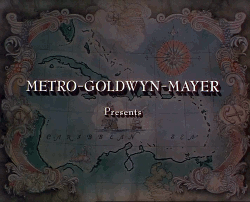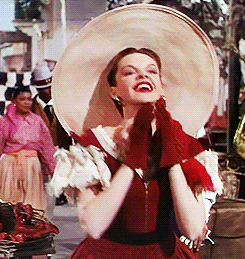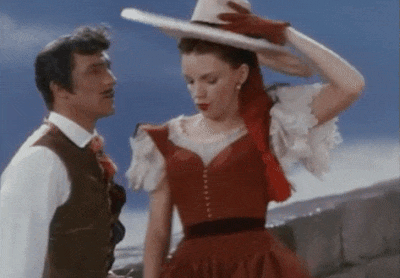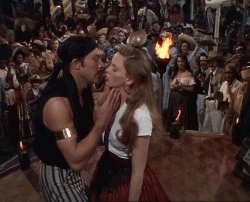Quando
você tem dois artistas cujas obras incluem “O Mágico de Oz” (1939) e “Cantando
na Chuva” (1952), é fácil esquecer os outros filmes deles. “O Pirata” em geral
passa despercebido quando discutimos as filmografias de Judy Garland e Gene
Kelly, mas não deveria: é um musical delicioso, bem feito e apaixonante. E um
que merece o selo de “cult”.
When
you have two performers whose careers included “The Wizard of Oz” (1939) and “Singin’
in the Rain” (1952), it’s easy to overlook their other films. Often, “The
Pirate” is overlooked in the context of both Judy Garland’s and Gene Kelly’s filmographies,
but it shouldn’t be: it’s a delightful, well-done, passionate musical. And one
that also should receive a ‘cult’ label.
Manuela
(Judy Garland) é uma sonhadora. Ela sonha com romance, quer sair da vila onde
mora e viver grandes aventuras com seu grande amor. Ele é uma órfã, e a tia que
a criou, Inez (Gladys Cooper) arrumou-lhe um casamento com o novo prefeito da
vila, Don Pedro Vargas (Walter Slezak). Manuela não está nem um pouco animada.
Mas ela quer viver uma última aventura antes de se casar, e por isso viaja para
Porto Sebastian para conhecer o mar do Caribe e buscar seu vestido de noiva.
Manuela
(Judy Garland) is a dreamer. She dreams about romance, and wants to leave the
village she lives in and live big adventures with the love of her life. She is
an orphan, and the aunt who raised her, Inez (Gladys Cooper), has arranged a
marriage with the village’s new mayor, Don Pedro Vargas (Walter Slezak).
Manuela couldn’t be less thrilled. But she wants to go on a last adventure
before getting married, and travels to Port Sebastian to see the Caribbean Sea
and get her wedding gown.
Em
Porto Sebastian ela conhece Serafin, um mulherengo ator de Madrid. Ele dá em
cima de todas as “ninas”, mas parece que com Manuela foi amor à primeira vista –
e não correspondido. Por isso ele se anima quando a vê na plateia de seu show,
e a hipnotiza como parte de um truque. Ela confessa que não ama o noivo, e
estaria mais feliz vivendo aventuras com Macoco, o famoso pirata negro.
In Port
Sebastian she meets Serafin, actor and womanizer from Madrid. He hits on every
single ‘ninã’, but it looks like that with Manuela it was love at first sight –
but unrequited. That’s why he gets excited when he sees her in the audience at
his show, and hypnotizes her as part of a trick. She confesses she isn’t in
love with her fiancée, and would be better living adventures with Macoco, the
famed black pirate.
Agora
Serafin sabe one Manuela vive, e vai atrás dela – em trajes de pirata, ainda
por cima. Ele faz isso porque ele cantou enquanto estava hipnotizada, e a
performance dela foi sensacional. Agora, ele quer levá-la em uma vida de
aventuras como artista itinerante.
Now
Serafin knows where Manuela lives, and goes after her – in pirate’s clothes, no
less. He does this not only because he is in love, but also because she sang
while hypnotized, and her performance was wonderful. Now, he wants to take her
on a life of adventures as a travelling performer.
“O
Pirata” foi o segundo de três filmes que Judy e Gene fizeram juntos. O primeiro
foi “Idílio em Dó-Ré-Mi” (1942), um musical emocionante que também foi a
estreia de Gene no cinema. Nesta segunda parceria, eles mostram ótima química e
grande timing cômico. Na parceria
final, “Casa, Comida e Carinho” (1950), vemos Judy acima do peso e lidando com
seus demônios, mas sendo ajudada pelo sempre generoso Gene. Eles também
deveriam ter contracenado em “Desfile de Páscoa” (1948), mas Gene machucou o
tornozelo pouco antes de começarem as gravações e foi substituído por Fred
Astaire.
“The
Pirate” is the second of three films Judy and Gene made together. The first one
was “For Me and my Gal” (1942), a heartbreaking musical which was also Gene’s
film debut. In this second pairing, they show how good their chemistry and comedic
timing are. In the final collaboration, “Summer Stock” (1950), we see Judy
overweight and battling her demons, but being helped by an always generous Gene.
They were also set to star together in “Easter Parade” (1948), but Gene injured
his ankle before filming began and was replaced by Fred Astaire.
Gene
Kelly nunca foi tão atlético – nem suas coxas foram tão sexy. Ele está em sua
melhor forma escalando prédios no primeiro número musical, e combina os passos
perfeitamente com os intrépidos Nicholas Brothers mais tarde no filme. Os
irmãos foram contratados por insistência de Judy e Gene, mas a participação
deles no filme – e o fato de que eles dançaram ao lado de um homem branco –
tornou-os párias na comunidade musical. O número deles foi cortado do filme em
diversos estados segregacionistas e os irmãos foram viver e se apresentar na
Europa.
Gene
Kelly never looked so athletic – nor his thighs so sexy. He is at his best climbing
buildings in his first musical number, and matches his steps perfectly with the
ones of the Nicholas Brothers later in the film. The brothers were hired by
Judy and Gene’s insistence, but their participation in the film – and the fact
that they danced with a white man – kind of ostracized them in the musical
community. Their number was cut in several segregation states and the brothers
went to live and perform in Europe.
A
paleta de cores parece uma mistura de “Agora Seremos Felizes” (1944), também
dirigida por Vincente Minnelli, e “O Cisne Negro” (1942). É lindo, como a
maioria dos filmes de Minnelli. Eu apenas gostaria que houvessem MAIS números
musicais – no meio do filme, ou quando Judy e Gene estão na casa do prefeito.
The color
palette looks like a mix of “Meet Me in St. Louis” (1944), also directed by
Vincente Minnelli, and “The Black Swan” (1942). It is beautiful, as most of
Minnelli’s films are. I just wish that there were MORE musical numbers – in the
middle of the film, or when Judy and Gene are at the mayor’s house.
É de se
espantar que a presença luminosa de Judy não transpareça em nada os problemas
que ela enfrentava longe das telas. Mesmo assim, o filme foi um fracasso de
bilheteria, e o único filme de Judy na MGM a dar prejuízo. Mas, como aconteceu
com tantos fracassos, o filme foi redescoberto e passou a ser cultuado –
gerando a estranha ideia do casal fictício “Jugenea”. Eu nunca fui tão longe
quanto estes dedicados fãs, mas digo que “O Pirata” está entre os melhores
musicais do século XX.
It’s
impressive that Judy’s luminous presence in this movie doesn’t mirror at all
the problems she was facing off-screen. Nevertheless, this film was a
box-office flop, and the only Judy picture at MGM to lose money. But, as happened
to so many flops, it was rediscovered and a cult following appeared –
generating the odd “Jugenea” fictional couple idea. I never got so far as these
dedicated fans, but I say that “The Pirate” is among the best musicals of the
20th century.
This is
my contribution to the Vincente Minnelli blogathon, hosted by Michaela at Love
Letters to Old Hollywood.







6 comments:
LOVE this. I adore this movie, but sometimes it feels like I'm the only one. I agree with absolutely everything you said. And those gifs! Heavenly! I'm so, so happy that you contributed this piece! Thanks for supporting my first blogathon! :)
I like the premise and I appreciate the execution, but I've never been able to commit fully to The Pirate. Perhaps next time, with your article in mind, it will win me over.
Excellent write up! I haven't watched this in a long time, but it's one of my favorites.
Wow - it's amazing to think that was her only film to lose money. I always knew she was a big star, but that's impressive that every other movie she made was financially successful.
Really enjoyed your review of this film! I've only seen it once (not sure why it was only once), but clearly need to see it again. I love Gene Kelly and Judy Garland together!
What a wonderful post! The Pirate is a bit insane on all counts, but a lot of fun and a gorgeous production! So much talent all around!!
Judy Garland acima do peso em "Casa, Comida e Banho"? Não, não! Ela estava com ótima aparência! Talvez os problemas dela fosse o padrão exigido das telinhas naquela época.
Post a Comment